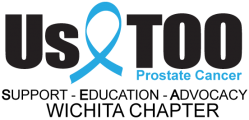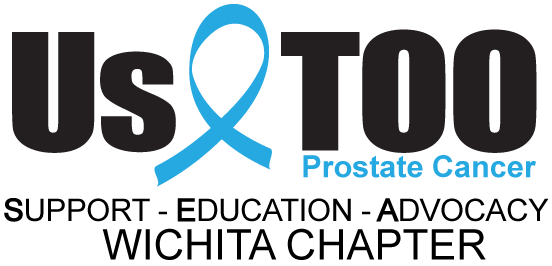HISTORY
Prostate Cancer Support Group Wichita
(aka Wichita, Kansas Chapter, Us TOO Intl., Inc.)
By Charles C. Maack – Prostate Cancer Activist/Mentor
The Prostate Cancer Support Group Wichita (aka Wichita, Kansas Chapter, Us TOO Intl., Inc.) is a support group for prostate cancer and other disorders of the prostate.
The name “Us TOO” is derived from bringing to the attention of everyone, particularly men, at a time when the primary cancer focus was on breast cancer, where the term “Y-ME” was used, the fact that there is also a men’s cancer that is very life threatening. Thus, “Us TOO!”
The headquarters for Us TOO is located in Des Plaines, Illinois. The Wichita chapter began April 11, 1994 following the lead of a local church pastor, Ken Short, who, as a prostate cancer survivor, saw the need for such a support group. He sought the assistance of a local physician to assist his endeavor and was referred to Wichita Urologist Dr. A. J. Farha. Dr. Farha agreed to the necessity of such a group and together they contacted other prostate cancer survivors. Duane Hurtig and retired anesthesiologist Dr. Bob Hustead responded. The four then arranged for meeting facilities and support. The chapter continues to grow. Dr. Bob was appointed to the National Board of Us TOO in 2000 and his association with National and his advocacy and mentoring prior to his death from pneumonia in December 2008 had been most valuable to our chapter.
The chapter is a non-profit, charitable prostate cancer support group incorporated in the State of Kansas for men with prostate issues or diagnosed with prostate cancer, for their caregivers, for survivors with continued interest in prostate cancer, and for anyone interested. They meet in order to provide assistance to those seeking a better understanding of the prostate and prostate cancer. The emphasis is to help them to continue to lead healthy and productive lives, physically, mentally, and spiritually, by offering fellowship, shared counseling, a positive mental outlook, and discussions pertaining to updated medical options.
A group of volunteers meet as a Coordinating Committee every month prior to the regular monthly meeting to discuss new information received from prostate cancer periodicals, the internet, physicians, or other sources, then determine how to disseminate this information to members. They determine topics for future meetings, then, in addition to Open Forum meetings, contact area professionals to impart information relative to these topics or provide DVD medical and scientific presentations recorded at the annual Prostate Cancer Research Institute (PCRI) Conference on Prostate Cancer held each year in Los Angeles.
Speakers include urologists, oncologists, radiologists, pathologists, psychologists, nutritionists, and basically anyone who has the experience to impart information relative to prostate cancer or other topics of interest.
The chapter meets the second Monday of every month at 7:30 P.M. in the McNamara Center on the third floor of Via Christi St. Joseph Hospital on East Harry Street and attendance is free to everyone. The topics at meetings cover the gamut of prostate related maladies including the various surgical procedures, radiation procedures, hormonal treatments, effects of incontinence or impotence and their treatment, Benign Prostatic Hyperplasia (BPH – enlargement of the prostate, but non-cancerous), diet and nutrition, and many other topics related to prostate cancer.
Most members of the group have experienced at least one of the many effects of prostate related problems and many have experienced more than one. Prostate cancer can become a very aggressive cancer which can result in more than one method of treatment to combat this disease. It is for this reason that this informational group is so important – so participants have the opportunity to become better aware and more knowledgeable of all the effects that can occur and be better able to work with their physician in the decision as to what should be their subsequent treatment. Many of the men of this group have become advocates to spread awareness of prostate cancer to the community as well as online worldwide. Early detection can result in a complete cure. Delayed detection can result in many complications and, in too many cases, can be life threatening. Many of the men in the group subscribe to several research periodicals, “surf” the internet to find information, monitor internet prostate cancer support lists, question professionals to glean knowledge, and as a result, have become fairly knowledgeable and conversant regarding prostate cancer in order to bring this information to others so that they, too, may have a better understanding of their cancer.

